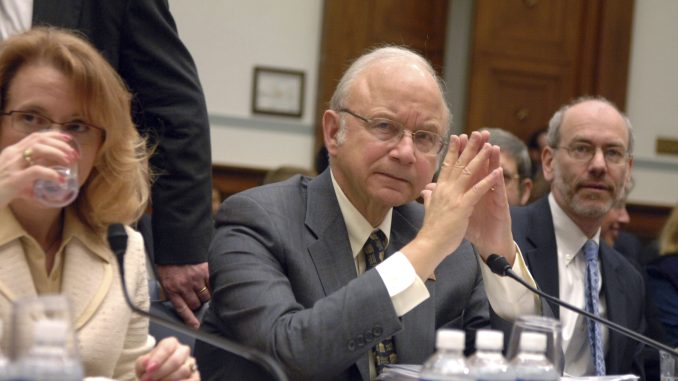
Rep. Jim Jordan, R-Ohio, wanted to know who blocked release of an official statement from the National Archives and Records Administration about classified documents discovered in a Washington office used by Joe Biden before he became president.
“I’m not talking about communications outside NARA,” Jordan said during a newly disclosed interview with Gary Stern, general counsel for the National Archives and Records Administration since 1998.
Stern, who besides being the National Archives’ top lawyer is also its chief Freedom of Information Act officer, was interviewed Jan. 31 by Jordan and other members and staff of the House Oversight and Accountability Committee.
“I’m talking about inside NARA. Did someone tell you not to put it out within the National Archives?” Jordan asked.
“No,” Stern answered.
Jordan was asking why the National Archives didn’t put out a statement about the classified information found Nov. 2 in Biden’s former private office at the Penn Biden Center for Global Engagement. CBS News first reported discovery of the classified documents Jan. 9.
The House Oversight and Accountability Committee wants to know who blocked such a statement—the National Archives had issued many when former President Donald Trump was under similar scrutiny—and is asking whether the White House prevented a statement.
This week, the committee disclosed its Jan. 31 interview with Stern about the National Archives’ actions regarding Biden’s potential mishandling of classified documents.
Just days before the interview, The Daily Signal reported Jan. 23 that the agency wasn’t responding to questions about the Biden documents. Its reply: “Thank you for reaching out, the National Archives has no comment.”
By contrast, NARA issued 10 separate statements from January to December 2022 about disputed documents kept at Trump’s Mar-a-Lago estate in Florida.
Some of the contents of the interview with the National Archives’ Stern were included in a letter from committee Chairman James Comer, R-Ky., to new White House chief of staff Jeff Zients.
A White House spokesperson told CBS News on Tuesday that the White House didn’t order the National Archives not to release a statement on the classified documents found at the Penn Biden Center.
When news reports first surfaced Jan. 9 about the discovery of those classified documents, Stern said during the interview, the National Archives had prepared a public statement for the press.
According to a transcript of the interview, counsel for the House committee asked Stern: “Did you draft a statement in response to that CBS report?”
Stern replied: “NARA did draft a statement.”
“Did it go public?” the committee lawyer asked.
“No,” Stern replied.
But when asked, the general counsel for the National Archives didn’t say who prevented the statement from being issued to the public and referred to Justice Department guidance.
“According to the DOJ guidance, I’m not supposed to talk about the, you know, content of our communications with other parties,” Stern said during the interview.
The committee’s Republican staff lawyer noted this was a stark contrast to the NARA’s public statement immediately after news broke Feb. 7, 2022, that classified documents had been discovered at Trump’s Florida home.
“So I just want to be clear. You published, being National Archives, a statement regarding President Trump’s alleged possession of these materials at Mar-a-Lago the same day that The Washington Post story breaks, correct? Is that right?” the committee counsel asked.
Stern replied: “We did, yes.” He later added: “I helped draft it, yes.”
“But then, on Jan. 9 of 2023,” the committee lawyer asked, “when the story breaks with CBS that President Biden has materials that are classified and subject to the Presidential Records Act, the National Archives actually drafted a press statement that has never made it to light?”
Stern replied: “Yes.”
According to excerpts of the interview released separately by Rep. Jamie Raskin, D-Md., the committee’s ranking member, Democrats’ staff lawyer asked Stern: “When you released a statement in February of 2022, there had been not—DOJ had not been involved at all in the collection of the Trump documents?”
“Well, it hadn’t been referred to them by OIG,” Stern replied, referring to the National Archives’ Office of Inspector General.
Democrats’ counsel followed up by noting that the National Archives itself “states in no uncertain terms that it’s the policy of the National Archives not to comment on potential or ongoing investigations—”
Stern: “Correct.”
“So releasing a press statement in that moment would violate the NARA policy … ?”
Stern: “I mean, potentially, yes.”
The classified information discovered at the Penn Biden Center, a think tank associated with the University of Pennsylvania, date back to Biden’s time as a U.S. senator representing Delaware from 1973 to to 2009.
More classified documents were discovered later at Biden’s residences in Delaware. The FBI also searched for classified documents at the University of Delaware and a private law office in Boston.
In the interview, Stern said Biden is “free to release” all communications from his lawyers and National Archives to the public, if he so chooses.
The committee’s Republican counsel then asked: “But there’s nothing preventing the president of the United States from releasing the emails from his representatives and his attorneys to the National Archives for the public to view. In other words, the National Archives isn’t preventing President Biden from releasing those documents, correct?
“That is correct,” Stern replied, adding:
And that’s the same with President Trump and his representatives. They are free to release, you know, the communications they receive from us. We treat them as—we treat them as confidential, but the recipients, you know, can act independently if they want to.
Have an opinion about this article? To sound off, please email letters@DailySignal.com, and we’ll consider publishing your edited remarks in our regular “We Hear You” feature. Remember to include the URL or headline of the article plus your name and town and/or state.

